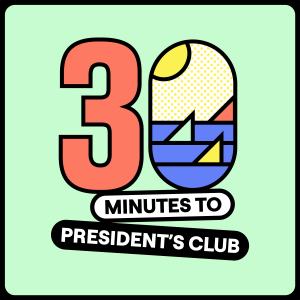

Procrastination is not just the act of delaying an action, it’s unnecessarily postponing things in a way that doesn’t make sense, and may even cause you harm. Sound familiar? Of course it does! Turns out that 95% of us admit to procrastinating (and the other 5% are probably lying).
SHOW NOTES
Procrastination has negative effects to all aspects of our well-being – from financial to physical health. But like all things, there is a reason we do something that is not so good for us. After a study, Drs. Pchyl and Sirois concluded procrastination is really about avoiding negative moods and emotions associated with a task. And the task may be negative because it is hard, boring, frustrating, meaningless, ambiguous etc. We just do not want to do it. Sooo, we delay because we want to avoid those negative feelings.
The delay creates something identified by many experts as the procrastination cycle. We have an expectation of ourselves that we are supposed to do something, we have some discomfort about what we are supposed to do, which in the moment is rewarded by avoiding the discomfort associated with the task, but then we have not done what we expected of ourselves – and we feel bad.
When we are in this cycle, we have a hard time imagining what it will be like when we do not meet the expectation we have set for ourselves – or let someone else set for us. Our present self feels great avoiding the discomfort – and is not considering that our future self will be stressed, lose opportunities, get disciplined or fired by our boss, feel awful we let down a co-worker . . ..
- What does the research say about procrastination:
- Get in touch with how your future self will feel if your present self procrastinates
- As always, be gentle with yourself. Students who forgave themselves for not studying for a test ended up procrastinating far less on the next test. Solving the Procrastination Puzzle
- Get curious about why – what is the negative feeling?
- Remember getting the thing done will relive the negative emotion
- Be OK with “not being in the mood.” It is okay not to feel like doing something, but still do it
- Break tasks down into smaller bits
- Make is easy for yourself - set a specific time to do something, combine it with something you like, break tasks into smaller bits
- Bribe yourself – i.e., if I get this done, I will treat myself
5 Research-Based Strategies for Overcoming Procrastination
The real reasons you procrastinate — and how to stop - The Washington Post
Why You Procrastinate (It Has Nothing to Do With Self-Control) - The New York Times
Vicious Cycle of Procrastination.pub
fMRI scans of people’s brains
More Episodes
All Episodes>>Create Your Podcast In Minutes
- Full-featured podcast site
- Unlimited storage and bandwidth
- Comprehensive podcast stats
- Distribute to Apple Podcasts, Spotify, and more
- Make money with your podcast












